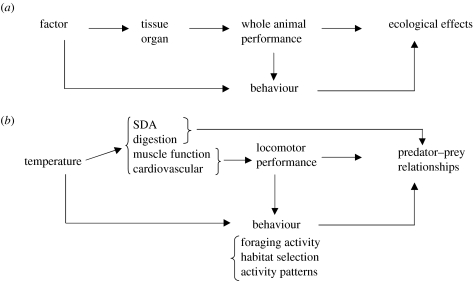Figure 1.
(a) The generalized effect of a given environmental factor on whole animal performance, behaviour and ecology in aquatic organisms. A given factor can directly affect the organism's behaviour and its tissue and organ functions, and consequently whole animal performance. This can have effects at the behavioural level as well. Ultimately, altered behaviour and whole animal performance will have ecological effects. (b) The effect of temperature on the locomotion and predator–prey relationships of ectotherms. Temperature has direct effects on digestion and standard dynamic action (SDA) as well as on muscle and heart function. Effects on digestion can cause direct effects on predator–prey relationships. Effects on muscle and heart function have direct effects on swimming performance and, therefore, indirectly upon those predator–prey relationships which are dependent on locomotion. Temperature can also have direct and indirect effects on behaviour, through changes in habitat selection (a direct effect) and activity patterns (an indirect effect through change in locomotor performance). Behavioural changes will ultimately affect predator–prey relationships at the ecological level.

